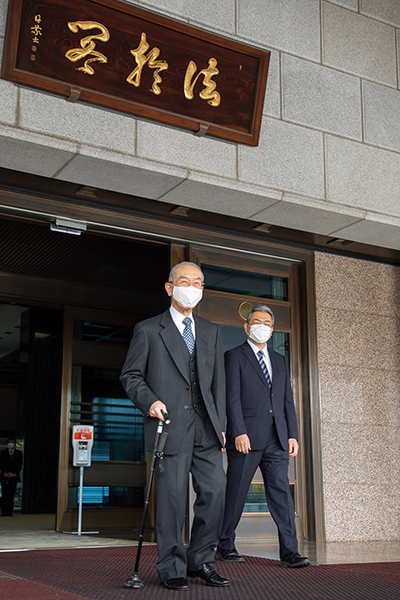Every One of Us Is an Oasis
January 2025

A Departure Station Called “New Year’s”
Happy New Year!
New Year’s is when everyone welcomes the beginning of the year and makes a fresh start together. In other words, it is like the departure station on a railroad track. New Year’s also presents us with a fine opportunity to make a new vow, based on a review of the past year, and turn over a new leaf. To quote a poem by Mokichi Saito (1882–1953), “At the start of a new year, / Focus on one thing, / Put your mind to it, / And move forward.” Similarly, at this departure station, we want to make sure to be well prepared for the year-long journey that lies ahead. By the way, what vow did you make and decide to “put your mind to, and move forward” with?
This year, I am blessed to celebrate my beiju (one’s eighty-eighth birthday, according to the traditional Japanese way of counting years), something for which I am extremely grateful and happy. No matter how old we are, though, if it is human nature to aim for growth and self-improvement, then I think that a beiju birthday is just another milestone, a stop along the railroad track of life, and once I get over this hill, I can take on the next one. For this reason, once again this year, I hope to continue progressing and growing, while always remembering to be diligent and considerate of others.
This is my annual plan that never changes, but in recent years, it has been particularly important for me to make a greater effort to “develop people.”
The earth is a beautiful planet of blue water, floating in the universe, but its environment is deteriorating year by year, while the human beings living there endlessly engage in conflict and war. . . . This state of affairs reminds me of the importance of each and every one of us making it part of a personal plan to raise people who have a rich sense of humanity and who truly understand the pain of others. After all, we have a responsibility to leave behind a beautiful planet earth, where there is harmony in the minds of people as well as in the environment.
Growing a Tree in Your Mind
As I have mentioned before, looking ahead to the one hundredth anniversary of the founding of Rissho Kosei-kai, we should make “raising human beings” a priority. Speaking from our position as Buddhists, this means that through the Buddha’s teachings, we are raising bodhisattvas—people with the mind of consideration who do their utmost for others and who want to not only make themselves happy but also bring happiness and liberation to members of their families, their communities, and even people on the other side of the world.
Wherever there is a bodhisattva whose mind is like an oasis, giving people comfort and peace of mind, that place becomes an oasis. The ideal I envision is that when such people gather together, they form an oasis called a local sangha (a community sharing the same faith), which will expand as a place that nourishes people’s minds. Of course, the primary goal is not the development of this organization, but rather an ideal stemming from an urgent sense of danger regarding the future of the earth and humanity.
On the one hand, in olden times, there were people who had murderous intentions, even toward Shakyamuni, and since the emergence of the human species, the human desire to do whatever one pleases has never changed; furthermore, the trend has only been for greedy desires and violent impulses to multiply. On the other hand, just as greedy desires are without limit, those who came before us taught us that our ideals must also be without limit. Without ideals, there can be no progress, and making ideals into reality is the purpose of human life. Each of us is standing at the starting line of realizing an ideal. It begins when you become like a tree in an oasis for your own family, and then your family becomes like an oasis for your neighborhood.
In Buddhism, taking life—that is, taking the life of another person—is considered the greatest wrongdoing. Therefore, practicing compassion—doing things like acting and speaking with kindness and consideration toward others every day—helps us understand the sanctity of life and our oneness with others. Such practices are also a form of benefiting others and can lead to planting flowers and trees that become a new oasis in people’s minds. In this way, getting along well with many people, living life to the fullest in the present moment, and showing gratitude toward one another means, in the words of Founder Niwano, “transferring merits to those entrusted with what comes after us”—that is, connecting with the future by transferring merits to future generations.




